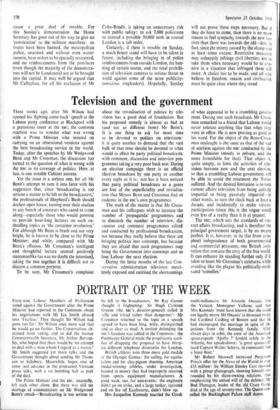Television and the government
Three weeks ago, after Mr Wilson had opened his 'fighting come-back' speech at the Labour party conference at Blackpool with a gratuitous sneer at the BBC, the common reaction was to wonder what was wrong with a Prime Minister who insisted on carrying on an obsessional vendetta against the best broadcasting service in the world. Today, after the speeches by Mr Wedgwood Berm and Mr Crossman, the discussion has turned to the question of what is wrong with the BBC in its coverage of politics. Here, at last, is one notable Cabinet success.
Yet the issue is a serious one, for all Mr Benn's attempt to turn it into farce with his suggestion that, since `broadcasting is too serious a matter to be left to the broadcasters,' the professionals of Shepherd's Bush should declare open house, turning over their studios to any bunch of amateurs who cared to come along especially those who would promise to provide hour-long lectures on such en- thralling topics as 'the container revolution: For although Mr Benn is brash and, not very bright, he is known to be close to the Prime Minister; and while, compared with Mr Benn's effusion, Mr Crossman's intelligent and thoughtful lecture seemed positively statesmanlike (as was no doubt the intention), taking the two together it is difficult not to discern a common purpose.
To be sure, Mr Crossman's complaint about the trivialisation of politics by tele- vision has a good deal of foundation. But his proposed remedy is almost as bad as (and not so different from) Mr Benn's. It is one thing to ask for more time to be devoted to politics on television: it is quite another to demand that the vast bulk of that time should be devoted to what would in effect be party political broadcasts, with comment, discussion and interview pro- grammes taking a very poor back seat. During an election campaign there is an official election broadcast by one party or another every night as it is: nor has it been noticed that party political broadcasts as a genre are free of the superficiality and trivialisa- tion that Messrs Berm and Crossman find so endemic in the BBC's own programmes.
The truth of the matter is that Mr Cross- man and his colleagues wish to increase the number of 'propaganda' programmes and to diminish the number of interview, dis- cussion and comment programmes edited and conducted by professional broadcasters, not because they really believe that these are bringing politics into contempt, but because they are afraid that such programmes may bring the Government into contempt and so lose Labour the next election.
During the latter months, of the last Con- servative administration television merci- lessly exposed and satirised the shortcomings of what appeared to be a crumbling govern- ment. During one such broadcast, Mr Cross- man remarked to a friend that Labour would never tolerate anything like that when they were in office. He is now proving as good as his word. For the object of the Benn-Cross- man onslaught is the same as that of the war of attrition against the Bac condncted by the Prime Minister (mostly in private, and the more formidable for that). That object is, quite simply, to lintit the activities of tele- vision between now and the next election, so that a crumbling Labour government will be able to avoid the treatment the Tories suffered. And the desired limitation is to turn current affairs television from being actively impartial to being passively impartial—in other words,, to turn the clock back at least a decade, and incidentally to .make viewer- participation (since this, is the vogue word) even less of a reality than it is at present.
The BBC, which sets the standards of cur- rent affairs broadcasting, and is therefore the principal government target, is by no means perfect. It is,, however, in its (far from com- plete) independence of both governmental and commercial pressures, one British insti- tution that remains the envy of the free world, It can enhance its standing further only if it takes to heart Mr Crossman's strictures, while avoiding like the plague his politically-moti- vated 'remedies.'














































 Previous page
Previous page